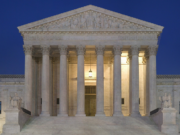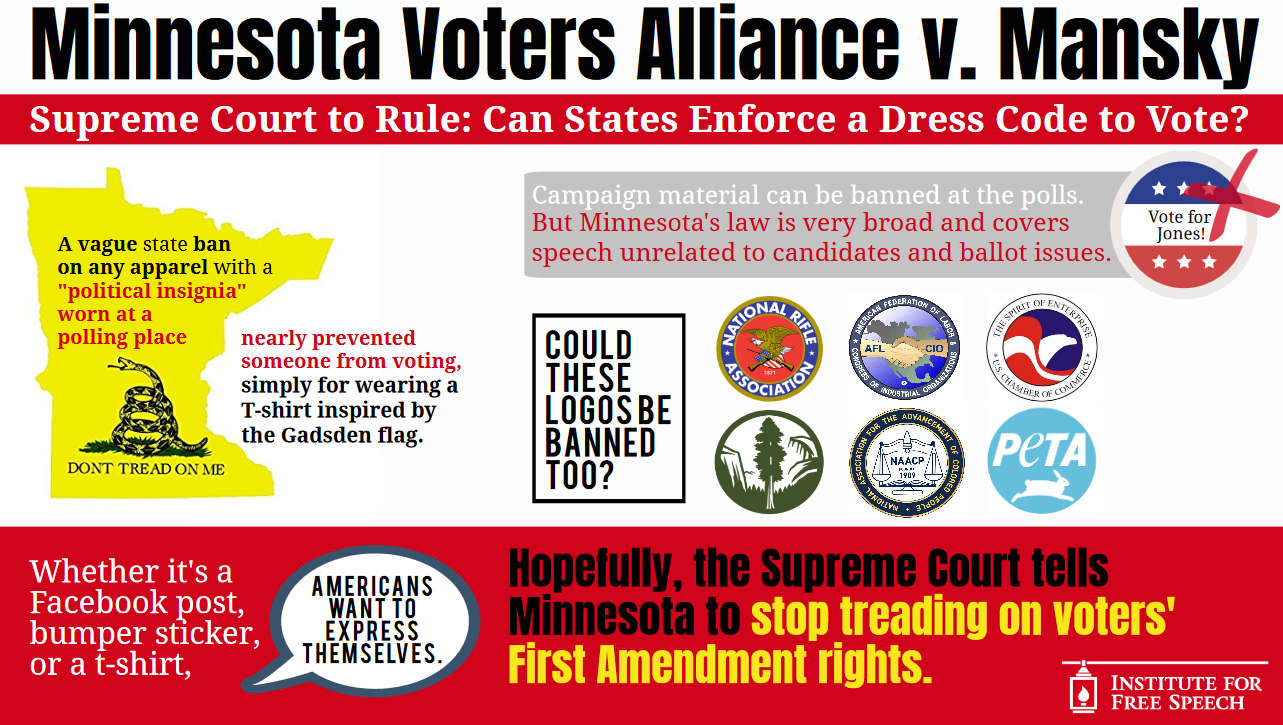What does calling “bullshit” on instructions from the U.S. Park Police have in common with the IRS targeting of certain nonprofit groups for heightened scrutiny, and with Washington Nationals legend Ryan Zimmerman? All three figure into the free speech jurisprudence of reported Supreme Court finalist Judge Ketanji Brown Jackson.
Judge Jackson was a District Judge for the United States District Court for the District of Columbia from 2013-2021 and has served as a United States Circuit Judge for the Court of Appeals for the District of Columbia since June 2021.
Overall, Judge Jackson’s public record on free speech issues is relatively sparse. There are few relevant cases from her tenure as a District Court judge and none to date as a Circuit Court judge. In general, these decisions reflect a willingness to allow plaintiffs’ First Amendment claims to survive a motion to dismiss. However, these cases reflect a limited range of issues.
Readers are cautioned not to extrapolate too broadly from a District Court ruling, where a judge may be compelled to follow circuit precedence in a way that they might not on the high Court.
Judge Jackson has also answered several free speech related questions during her confirmation process. These are noted below.
Patterson v. United States, 999 F. Supp. 2d 300 (D.D.C. 2013)
Can you be arrested for saying the “F-word” in public? That was one of the underlying questions in what is arguably Judge Jackson’s most significant First Amendment ruling. In Patterson, Judge Jackson ruled that you cannot, and that Plaintiffs can pursue a constitutional tort claim under Bivens v. Six Unknown Named Agents of the Federal Bureau of Narcotics, 403 U.S. 388 (1971) against federal officers for First Amendment violations.
The plaintiff was part of the “Occupy D.C.” protest, when he allegedly saw counter protestors and uttered several statements containing profanity. Plaintiff contended that the statements were not directed at the counter protestors, and that the counter protestors did not react to his comments. Plaintiff was approached by several police officers, who instructed him not to use profanity. Plaintiff responded “I can’t say fuck?” After being told that it was his “second warning,” Plaintiff responded “That’s fucking bullshit.” At that point, Plaintiff was arrested for disorderly conduct. Plaintiff sued, alleging violations of his First and Fourth Amendment rights. Defendants claimed in part that there was no Bivens remedy available for a First Amendment claim.
The court, per Judge Jackson, disagreed, ruling “it is well established that where, as here, there is an allegation of retaliatory arrest in the absence of probable cause, the plaintiff has a viable First Amendment claim.” Judge Jackson went on to hold that the right not to be arrested without probable cause in retaliation for protected speech, including “the right to use profanity,” was clearly established, defeating an initial claim of qualified immunity at the motion to dismiss stage.
At the time of her nomination to the Court of Appeals for the District of Columbia Circuit, Judge Jackson referenced Patterson in response to a written question from Senator Cruz, stating “As a judicial officer, it is my duty to adjudicate individual claims of free-speech violations, and when I have jurisdiction to do so, I resolve properly filed legal disputes concerning violations of free speech based solely on the arguments that the parties make, the established facts of the particular case, and the applicable law.” Responses to Questions for the Record from Senator Ted Cruz to Judge Ketanji Brown Jackson, Nominee to the United States Court of Appeals for the D.C. Circuit at Question 27(a).
American Meat Institute v. United States Department of Agriculture, 968 F. Supp. 2d 38 (D.D.C. 2013)
American Meat Institute is a commercial speech case that involves a challenge to regulations implementing country-of-origin labels, alleging in part that the labels constitute compelled speech. The court, per Judge Jackson, ruled that country-of-origin labels constituted factual and uncontroversial information that was reasonably related to the government’s interest in preventing consumer deception, and denied Plaintiff’s request for a preliminary injunction based on compelled speech concerns. In doing so, Judge Jackson noted “it is well established that, when the compelled speech is commercial and purely factual in nature, the speaker’s First Amendment rights are not unduly burdened ‘as long as [the] disclosure requirements are reasonably related to the [government’s] interest in preventing deception of consumers.’” (quoting Milavetz, Gallop & Milavetz, P.A. v. United States, 559 U.S. 229, 250 (2010)).
Z Street, Inc. v. Koskinen, 44 F. Supp. 3d 48 (D.D.C. 2014)
Z Street relates to the infamous IRS targeting scandal. In Z Street, Judge Jackson ruled that the Plaintiff, a nonprofit corporation applying for recognition as a tax exempt entity under Section 501(c)(3) of the Internal Revenue Code, could pursue a First Amendment claim against the IRS alleging that the IRS subjected Israel-related organizations to a more rigorous review process than other organizations applying for the same tax status recognition. A contrary ruling would have made it difficult, if not impossible, to challenge First Amendment violations by the IRS.
Zimmerman v. Al Jazeera America, LLC, 246 F. Supp. 3d 257 (D.D.C. 2017)
In Zimmerman, the court, per Judge Jackson, concluded that baseball stars Ryan Zimmerman and Ryan Howard’s defamation and false light claims against the producers of a film alleging that Plaintiffs used performance enhancing drugs survived a motion to dismiss. The court dismissed claims against an individual who appeared in the film and relating to a news article promoting the film. In doing so, the court ruled that the film’s “contextual clues” move beyond mere reporting of allegations and “could lead a reasonable viewer to believe that [a featured individual] is credentialed and trustworthy, and that his statements . . . are true.” The court went on to note that the complaint alleged sufficient facts to support a claim of actual malice, based in part on reasons for the speaker to doubt the source’s veracity.
Brown v. District of Columbia, 390 F. Supp. 3d 114 (D.D.C. 2019)
Brown relates to a challenge to a D.C. anti-panhandling law. In Brown, the court, per Judge Jackson, held that Plaintiffs sufficiently alleged that a D.C. law prohibiting panhandling was a content-based speech restriction to survive a motion to dismiss.
Judge Jackson on the First Amendment Before the U.S. Senate Judiciary Committee
Judge Jackson and Threats to Free Speech
In response to a question regarding present threats to free speech, Judge Jackson stated “I do not draw upon, reference, or consider my personal views, if any, regarding present threats to free speech in America. Thus, it would be inappropriate for me to comment on the existence vel non of any such threats.” Responses to Questions for the Record from Senator Ted Cruz to Judge Ketanji Brown Jackson, Nominee to the United States Court of Appeals for the D.C. Circuit at Question 27(a). With respect to limits on Free Speech protections, Judge Jackson cited “fighting words” and “true threats.” Id. at Question 27(d)(ii).
Judge Jackson and Citizens United
When Judge Jackson was nominated for the United States Court of Appeals for the D.C. Circuit, she was asked several questions about Citizens United and the First Amendment. Her answers were generally noncommittal, stating:
“As a sitting federal judge, I am bound to follow Citizens United, as I would be if confirmed to the D.C. Circuit. I have not expressed any personal view about the Supreme Court’s application of First Amendment protections to campaign finance restrictions, or any other law, and it would not be appropriate for me to do so under the Code of Conduct for Judges, given the fact that I am bound by Supreme Court precedents and campaign-finance issues are the subject of ongoing legislative review.” Responses to Questions for the Record from Senator Tom Cotton to Judge Ketanji Brown Jackson, Nominee to the United States Court of Appeals for the D.C. Circuit at Question 12.
Judge Jackson also cited Citizens United as an example of the Supreme Court “interpret[ing] various constitutional provisions by attempting to ascertain the original meaning of the words used as understood by the public at the time of the Founding.” Responses to Questions for the Record from Senator Mike Lee to Judge Ketanji Brown Jackson, Nominee to the United States Court of Appeals for the D.C. Circuit at Question 3.
Judge Jackson and Buffer Zones Around Abortion Clinics
In 2001, Judge Jackson was listed on an amicus brief filed by several pro-choice advocacy groups in support of a Massachusetts law that established “a floating six-foot buffer zone around pedestrians and motor vehicles as they approach reproductive health care facilities.” See McGuire v. Reilly, 260 F.3d 36, 38 (1st Cir. 2001). When asked about her involvement with this brief, Judge Jackson noted that the brief was submitted while she an associate at the law firm Goodwin Proctor LLP, that she “was assigned to work on this amicus brief… among other projects,” and that she “[did] not recall how [she] came to work on this assignment.” Judge Jackson further stated that the analysis presented “in that brief is a legal argument that was made on behalf of my amici-clients,” and that “[a]s a pending judicial nominee and a sitting federal judge, it would be inappropriate for me to opine on the constitutionality of buffer zones that government officials might establish in hypothetical circumstances.” Responses to Questions for the Record from Senator Chuck Grassley, Ranking Member to Judge Ketanji Brown Jackson, Nominee to the United States Court of Appeals for the D.C. Circuit at Question 9.














